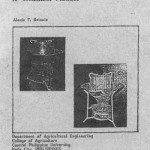A stove aims to maximize the use of farm waste as fuel utilizing rice hull, corn cob, sawdust or other agricultural wastes is developed by the Affiliated Non-conventional Energy Center (ASNEC) in collaboration with the Isabela State University and the Department of Energy.
It was a modification of the stove developed earlier by the Industrial Technology and Development Institute, Department of Science and Technology (DoST).
One version is a conical shaped center frustum, the inner cylinder of the burner is made longer and the bottom side is open to enable the smoke to easily pass through the burner and prevent fire suffocation during kindling and cooking due to accumulated smoke.
Another version is equipped with a smokestack placed on the upper portion of the combustion chamber. Similarly, the burner is also remodeled with the burner made wider, its bottom side is open to facilitate kindling and the passage of smoke through the burner.
Agricultural wastes such as rice hull and corn cobs are abundant and free in the country side and other rural areas, using them as fuel in the cook-stove means monetary savings on the part of the farmers or the rural folk users.
Another stove suitable for use in rural household is the conical grate rice hull stove developed by the Central Philippine University in Iloilo City. The rice hull consists of a conical grate, cylindrical plate cover, conical flue duct, pot holder, ash/char container with air pipe, ash char discharge level and plate. It rests on a three support legs.
Each grate is provided with 0.25 inch perforations around the base for the passage of primary air and for proper ventilation and efficient combustion. The cylindrical cover is fixed to the potholder and is made of a three-eighth inch diameter round bar.
A conical duct directs flue gas to the bottom of the pot, the stove can be fired within 20 to 25 seconds using one or two burning pieces of paper. The flame coming out from the stove is smokeless.
It consumes rice hull fuel at a rate of 1.67 kilos to 2.21 kilos per hour. Its thermal efficiency ranges from 19.61 to 21.28 percent. The stove is commercially available and sold from Php 300 to Php 700 pesos (US $7 to $16 dollars).
It can be costumed fabricated depending on the model and the kind of materials to be utilized. Farm waste as fuel, are very economical to use compared to utilizing wood charcoal or coconut charcoal fed stove.
